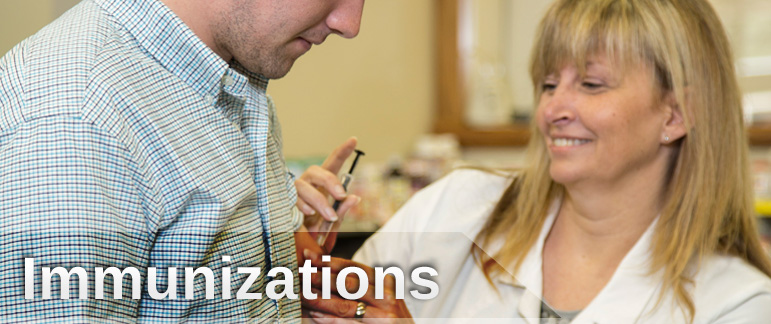Immunizations
To protect people from preventable infectious diseases that cause needless illness and death, MediSav Pharmacy offers a wide variety of in-store adult immunizations. If you are planning on traveling outside the United States, you may need additional vaccines.
Our pharmacists are certified and trained to administer the following vaccines to eligible patients at all MediSav Homecare Pharmacies
- Flu Vaccine
- Shingles Vaccine
- Pneumonia Vaccine
- Hepatitis A Vaccine
- Hepatitis B Vaccine
- Human Papillomavirus (HPV)
And other vaccines licensed by the FDA and approved by Arkansas State Board of Pharmacy, State of Arkansas practice act.
Flu Vaccine
The influenza vaccine or flu shot should be administered annually to protect against the influenza virus. The flu is highly contagious and is spread through respiratory droplets expelled through coughing and sneezing. Symptoms of influenza include fever, chills, sore throat, muscle pain, headache, coughing and fatique. About 40,000 people die each year in the U.S. from influenza. The Centers for Disease Control
Shingles
The Shingles vaccine protects against the virus herpes zoster. Almost 1 out of every 3 people in the United States will develop shingles, also known as zoster or herpes zoster. Your risk for developing shingles increases as you age. The vaccine is currently recommended for persons 60 years of age and older. Even people who have had shingles can receive the vaccine to help prevent future occurrences of the disease. Shingles is caused by the varicella zoster virus, the same virus that causes chickenpox. After a person recovers from chickenpox, the virus stays in the body in a dormant (inactive) state. For reasons that are not fully known, the virus can reactivate years later, causing shingles. However the risk of disease increases as a person gets older. About half of all cases occur among men and women 60 years old or older. At this time, CDC does not have a recommendation for routine use of shingles vaccine in persons 50 through 59 years old. However, the vaccine is approved by FDA for people in this age group.
Pneumonia
Pneumococcal vaccine is very good at preventing severe disease, hospitalization, and death. However it is not guaranteed to prevent infection and symptoms in all people. Pneumonia is an infection of the lungs that can cause mild to severe illness in people of all ages. Signs of pneumonia can include coughing, fever, fatigue, nausea, vomiting, rapid breathing or shortness of breath, chills, or chest pain. Certain people are more likely to become ill with pneumonia. This includes adults 65 years of age or older and children younger than 5 years of age. Previous recommendations from the CDC advised one time vaccine before age of 65 and one time vaccine after the age of 65. Those individuals with chronic bronchitis, Asthma, heart disease, lung disease, sickle cell disease, diabetes, alcoholism, cirrhosis, leaks of cerebrospinal fluid or cochlear implant and other high risk individuals that have a disease or condition that lowers the body’s resistance to infection should also get the Pneumonia vaccine.
Hepatitis A
Hepatitis A is a liver disease caused by the hepatitis A virus (HAV). Hepatitis A can affect anyone. Vaccines are available for long-term prevention of HAV infection in persons 1 year of age and older. Good personal hygiene and proper sanitation can also help prevent the spread of hepatitis A. Hepatitis A is usually spread by close personal contact and sometimes by eating food or drinking water containing HAV. A person who has hepatitis A can easily pass the disease to others within the same household.
Hepatitis B
Hepatitis B is a serious disease caused by a virus that attacks the liver. The virus, which is called hepatitis B virus (HBV), can cause lifelong infection, cirrhosis (scarring) of the liver, liver cancer, liver failure, and death. The vaccination schedule most often used for adults and children has been three intramuscular injections, the second and third administered 1 and 6 months after the first.
Human papillomavirus (HPV)
HPV vaccines protect against Human papillomavirus (HPV) infection and HPV-related disease. HPV vaccine is given in 3 shots over 6 months. The second shot is given 1 or 2 months after the first, and the third shot is given 6 months after the first shot. It is very important to complete all of the shots long before sexual activity begins, in order to be fully protected. To learn about who should and should not get this vaccine, when they should be vaccinated, and the risks and benefits of this vaccine, read the two CDC HPV vaccine information statements.
Travel Vaccines
Medisav is now offering the following travel immunizations. Please contact us to schedule your visit.
